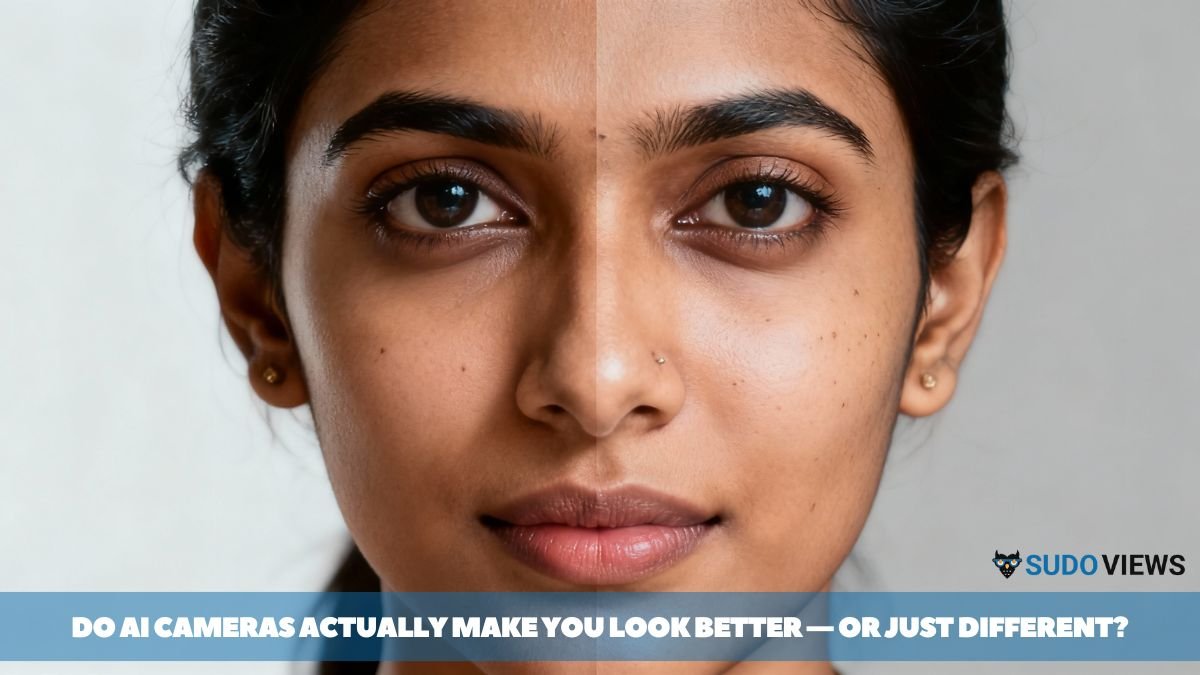Do AI Cameras Actually Make You Look Better — or Just Different?
You’ve probably noticed something strange.
You look great in your phone’s camera preview.
Skin smooth. Jawline snatched. Eyes bright.
Then you open the raw photo on your laptop and… reality hits.
So here’s the question we’re all silently asking:
Do AI Cameras Actually Make You Look Better — or just different?
Let’s break it down.

What Does “Looking Better” Even Mean in AI Cameras?
When someone asks “Do AI Cameras Actually Make You Look Better?”, they’re usually talking about one of two things:
- Beauty enhancements – like skin smoothing and eye brightening.
- Computational photography magic – fixing exposure, shadows, color tones.
AI cameras don’t just snap a picture.
They process it.
Your phone decides:
“Hey, this face looks better with less texture. Let me fix that.”
That’s not just a filter anymore.
That’s machine learning changing your appearance in real time.
How Do AI Cameras Change Your Face?
Here’s what modern phones do right after you tap the shutter:
- Detect faces instantly.
- Analyze skin tone, lighting, and facial structure.
- Apply AI-powered “corrections.”
These often include:
- AI skin smoothing (removes texture, acne, pores)
- Eye enhancement (whitens, sharpens, enlarges slightly)
- Jawline reshaping (minor slimming on many phones)
- Dynamic exposure (brighter face, darker background)
The phone doesn’t ask permission.
It just does it.
That’s why many people feel the camera shows a version of them that looks unreal—but addictive.
Is This Really You, or Just a Smart Filter?
We’re used to filters on Instagram and snapchat.
But now the filter is built into the camera itself.
Even if you turn off “beauty mode,” many phones still run background AI processing.
AI beauty mode explained:
- You might never see your actual skin texture in photos again.
- You get used to your “camera face,” not your real reflection.
- Some people start feeling uglier without AI processing.
Here’s the thing:
You’re not suddenly less attractive.
Your phone is just rewriting your baseline.
Why Do Phone Makers Push These AI Changes?
Because numbers don’t lie.
Phones with aggressive AI beautification get:
- Higher customer satisfaction
- Better social media feedback
- More people saying “this camera is amazing!”
But think about it:
If every phone shows a slightly edited version of you…
Are we all slowly drifting away from reality?
Does This Affect Men and Women Differently?
Yes.
Many brands apply stronger AI camera beauty filters on female faces by default.
Men get subtle sharpness and clarity boosts.
Women get smoother skin, slimmer jawlines, and brighter eyes.
And unless you zoom in, you might never notice what’s happening.
Are There Phones That Show the “Real” You?
A few brands are trying to stay natural.
Pixel phones, for example, lean toward realism.
iPhones are somewhere in the middle—still enhancing, but not as aggressively as some Android phones.
Then you have brands like Vivo, Oppo, and Xiaomi, which often default to heavily beautified looks in Asian markets.
So yes, the answer depends on what you buy.
Do AI Cameras Actually Make You Look Better?
Better for Instagram? Maybe.
Better for your self-image? That depends.
Ask yourself:
- Do I look like this in real life?
- Would people recognize me if I met them offline?
- Does comparing my “AI face” and mirror face make me insecure?
When a camera smooths every pore, it stops being a recorder and starts being a designer.
That’s not inherently bad.
But it’s not neutral either.
When Does It Become a Problem?
When you start feeling:
- “I only look good in my phone camera.”
- “Why do I look tired without Portrait Mode?”
- “I don’t want to post an unedited photo—ever.”
That’s your sign.
The camera isn’t enhancing anymore.
It’s replacing your idea of your real face.
So Should You Turn AI Processing Off?
Try this:
- Turn off beauty filters completely.
- Shoot the same photo in portrait mode and normal mode.
- Compare side by side.
You might hate the natural shot at first.
Give it a week.
Most people eventually realize:
“I don’t look bad. I just look real.”
Final Thoughts: Better or Just Different?
The honest answer:
Yes, AI cameras make you look better—but on their terms, not yours.
They enhance you based on algorithmic beauty standards.
Not personal preference.
Not individuality.
That’s the trade-off.
Convenience vs authenticity.
Before You Go: One More Thing
If this kind of breakdown interests you, check this related read:
What Happens If AI Goes Offline? | How Dependent Are We on Constant Connectivity
Your Turn 👇
Do AI Cameras Actually Make You Look Better—Do AI Cameras Change Your Face?
Would you rather look natural or algorithm-approved?
Drop your take in the comments. I’m genuinely curious.
For more tech trends, AI insights, and daily updates, follow us on Instagram @sudoviews.